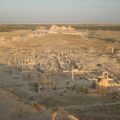The Lure of Antiquities

To think about antiquity is to think about time. It is an inevitable process. Ask yourself: what other way is there to describe how objects wear their histories? How else can we explain our utter inability to escape these concepts? These are questions as old as Antiquity itself, and so long as we continue to believe in a self, they will persist: the past, experienced through the prism of an ever-shifting series of right nows, is our label for all the time we have endured. Time is the specter that haunts antiquity, no matter whether we conceive of it as an era, object or person. Time is also a specter that haunts us; eventually, we all stop enduring. The existence of antiquities lets us know something else will live on once we cease to. Cynthia Ozick knows this better than anyone.
For her seventh novel, Antiquities (Knopf, 2021), Ozick has gifted us an antiquity of her own. A labyrinthine work through the mind of a formal institutionalist, Antiquities questions whether it is possible to preserve the past in the midst of a crumbling present. The particulars are grim: thirty-four years after the Temple Academy for Boys, an esteemed Westchester County boarding school, shuttered its doors, its seven surviving Trustees (who live on the Academy’s converted grounds, despite their infirmity and general wellbeing) have resolved by consensus to construct an album of memoirs to which they will each contribute a chapter. However, this premise is far more egalitarian than the text we receive.
As a compendium of fifty-seven entries, spanning three hundred and ninety-six days from 1949 to 1950, written by a single Trustee (Lloyd Wilkinson Petrie), Antiquities is a memoir of a memoir that tracks Petrie’s attempt to recall a series of boyhood encounters he had with his schoolmate, Ben-Zion Elefantin. Despite the promise of a collective record, Petrie’s is the only narrative to which we are given access. Properly understood, therefore, this text is a testimony.
“I’ve brought you something important. It’s only for you, no one else would understand.”
To conceive this testimony, one must begin with time. Much was made, in the lead-up to Antiquities’ release, of the author’s age. The novel was published just days before Ozick’s 93rd birthday, making this work about as late as late works get. Here, it is worth noting how this late period is mirrored in the text: despite our increasing inability to conceptualize the past, 1949 was the year Cynthia Ozick turned twenty-one. And so because of this, because of its setting as well as the end-of-life questions regarding memory and legacy the text raises, one begins to wonder whether Antiquities represents not simply an extraordinary achievement but also a literal reckoning.
This is Petrie’s memoir, however, not Ozick’s. The reader never glimpses any hint of Ozick amongst Petrie’s ruminations: her personal considerations remain withdrawn, walled off by intertext. What we receive, instead, is a novel deserving of multiple readings, the result of a singular style that helped influence the generation of writers who came in Ozick’s wake. Still, a writer who came of age in the Death of the Author, choosing to write about a dying man who writes—well, it is an easy mistake to make. Easier still when we consider the title: for this novel, there could be no other answer.
“Who will care for them as my father cared, and I after him? Who will be moved by their antiquity?”
What is contained in antiquity? More than you think. Its etymology is as ancient as its definition, proceeding from the Latin ante (before) and antīqu-us (former, earlier) before coming to mean: “The quality of being old (in the world’s history) or ancient; long standing, oldness, ancientness.” According to the O.E.D., a now-defunct secondary definition was made use of by the likes of Shakespeare and Marvell: “Old age (of human life); seniority.” Antiquity predates its cognates—including antique and antiquate—and is doublets with such disparate words as advance, and antic (a connection that grounds Petrie’s privilege and antisemitism in the text). Why does this history matter? Because Ozick knows it well.
The word appears first on the novel’s 24th page. “My father began to frequent the souks with their luring rows of antiquities shops, where he saw and he bought, and sometimes believed, and sometimes did not.” This account, recounted by Petrie from his deceased father’s notebook, doubles the text’s image while cementing its thesis: an old man labors over the history of items passed down to him—antiquity considers antiquity. But this account is no mere elucidation. The two-fold lesson it contains is our entry point to the novel’s inquiry.
The first lesson: antiquities are a form of testimony. Theirs is a story that can be questioned; in the right hands, their story can even be proven true. The second lesson is well-known to those of us who have ever reminisced over our lives. Antiquities are alluring for the same reason we wish to return to the place of our memories. The past is a seductive mistress.
“Nothing lasts, not even memory when the one who remembers is gone.”
But if memory is where we store our regrets, then history is where we record our losses. Antiquities provides no counterargument. This novel is a novel of loss: the loss of life and agency in the present; the loss of love and friendship in the past. Through it all, we feel the loss of time. The specter that looms over Petrie as he increasingly fails to navigate the present while losing himself further in the past. It is as if his every entry is an attempt to answer the question: is it possible to preserve the self by preserving the memory of another? But this question is perhaps kept best in the hands of a novelist.
For in a novel where seemingly everyone is seeking the “one significant thing,” no one understands significance quite like its author. Fifty-five years have passed since Cynthia Ozick began her career, and there is no doubting that it has been a significant one. Despite her portension to Eric Farwell that her books will fall “into posthumous eclipse” (and how worse we would all be for it), you cannot tell the story of American literature without Cynthia Ozick. If writing is the bare act of collecting words, then she has passed down enough of them to ensure she will not be easily forgotten. These collections will endure: this makes them significant. Antiquities is the significant thing.
About Z. L. Nickels
Z. L. Nickels is an MFA candidate at the University of Massachusetts Amherst. His current project is a collection of short stories consisting of retellings, reshapings, and reimaginings of canonical characters and works. His writing seeks to interrogate the question of meaning via classic tropes, including death, God, and the experiences of childhood.





